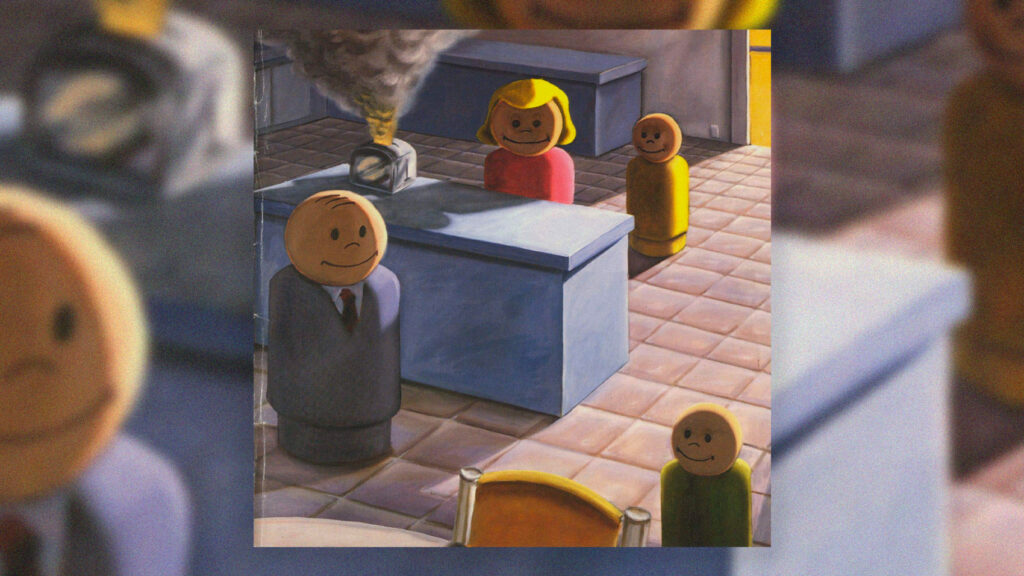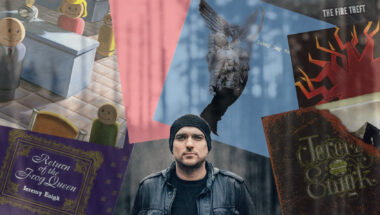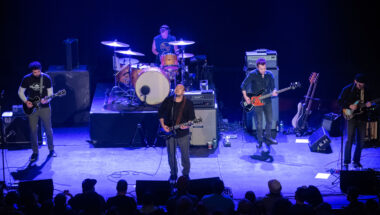Diary was already getting old when I was young enough for it to mean something to me. I was 12 years old when it was released in 1994, just the right age to miss it the first time around. But my feelings had not yet grown to be so complex, so urgently in need of release when it landed. Eventually it made its way into the stuffed Case Logic CD wallet stashed under the driver’s seat of my faded blue 1995 Mazda Protege. It made its way into everything I would come to love.
Emo is a genre that we catalog in waves, crashing upon the shores of our hearts. Sunny Day Real Estate was a towering whitecap peaking above the rest of emo’s second wave. They were the blueprint for a lot of the music we’d define as emo and obsess over after it was released. Diary was foundational for so much of what rock music was on the verge of becoming when it was recorded.
Sunny Day Real Estate is itself a band that is very much of its forebears. At times sounding like they had torn the same page out of the Pixies book that bands like Nirvana had, weaving elements of quiet and loud together into a singular thread. Where they stood afield was the hardcore and post-hardcore scene bleeding past their pop boundaries. Tempos shifted on a dime, crafting dense layers of indie-rock, pop and hardcore into the nascent energy of emo. You can hear the influence of the D.C. scene in its bones, Dischord bands and basement shows bleeding through every heart-wrenching moment.
With Diary’s opening salvo, “Seven,” Sunny Day Real Estate set itself largely apart from its labelmates on the venerated Seattle-based label Sub Pop, the label that launched a thousand grunge bands. Sub Pop was releasing albums by the likes of rockabilly Reverend Horton Heat and Cowpunk band The Supersuckers, bands that traded in a blend of country and rock. Their closest contemporaries at the time were Sebadoh—who at times felt like the distant cousin to Sunny Day Real Estate—who played in a complimentary fashion while eschewing closer to pop and indie rock. Jeremy Enigk sang with an urgent and tender ferocity, pained and yearning in equal measure. William Goldsmith hammering the drums so hard they feel as if they’re ready to burst through your stereo. “The waiting could crush my heart,” Enigk wails, and in an instant we feel his pain; a pain that we have all felt, stemming from a longing we cannot ignore.
It follows immediately with “In Circles,” perhaps the purest example of the sound and feeling Diary conjures. Moving slow at first, guitars that welcome you in to the calm embrace of their sincere desire to carry you onwards. Here, Enigk is reserved, holding back like a boxer pushing himself into the ropes, only to launch forward to land the hits when they will strike the hardest. This is a marriage of bombast and restraint, the push and pull of an emotional tether that ties us to a feeling we cannot escape.
I found Diary the way that great things tend to come into our lives: by hearing about it from other people who carry an undying love for it. My bedroom floor was littered with music magazines where the third-wave emo bands of my generation name-checked Sunny Day Real Estate in interviews. Hitting play on my CD player for the first time was like throwing myself down a flight of stairs, “Seven” hit me in the chest with everything it had and held me tight. It’s rare to put on a record and feel so immediately enraptured by the secrets you can only imagine it hides, every line Enigk sings felt like it was speaking to every part of my heart that yearned to be heard, even for just a moment. Diary unfolded for me over days, weeks, months. An obsession that grew and compounded on itself.
Diary spoke to my heart on endless nights, driving in my car to the house of a lover in a doomed young relationship. It’s the soundtrack to endless nights of sitting in a car with the headlights the only thing breaking the darkness, emotions so close to igniting and immolating me forever. I played it too loud and blew the high-end on the cheap speakers that came with my car as I drove to the house of someone I was worried I might lose forever, and it drowned out the sound of my pain as I drove home with the confirmation that I had.
You can hear Sunny Day Real Estate in everything that’s come after them. As the years dragged on and emo turned to a third wave that was brighter, poppier and more stadium-ready, Sunny Day Real Estate was still a signpost, standing there in the midst of everything showing the route which led us here, and all the directions we may go.
The treasure we find in revisiting Diary now is seeing just how far their influence bled, hearing moments in the scenes that have exploded beyond the possibility of second wave emo. Subtle nods in every corner of our lives since their brief turn as the darlings of a genre still finding its feet. Bands like Braid, Get Up Kids, and the Promise Ring at times sound like they were trading notes amongst themselves with secrets learned from Diary. Enigk’s painfully earnest vocals became a staple of the genre, the complex rhythms and time signatures never entirely replicated but hinted at by everyone from Thursday to Dashboard Confessional.
In the years since its release, Diary lives up to the promise of its title. Listening to it as a much older woman, with all the knowledge and scars of the years since it first came into my life, it is a portal back to a time when every emotion running the length of my body was all too raw, alight with an electricity that threatened to consume me if I wasn’t careful. It is hard to imagine I ever felt anything as earnestly as the caverns of feelings living in my heart when Diary was on endless repeat in my stereo. A re-listen would be difficult if it was only the memory of the moments associated with every second, the painful earnestness of youth.
The savior of Diary is another memory: that moment when you press play and are confronted with the undeniable fortitude of a band that felt like everything to anyone who was lucky enough to discover them. I have only the vaguest recollection of the pains of my heart when these songs meant everything to me, stronger now is the idea that this album is an indelible mark on my life that can never be erased.



